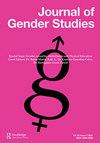The in_visibilization of emotions in politics. Ambivalences of an ‘affective democracy’
IF 1.5
3区 社会学
Q2 SOCIAL ISSUES
引用次数: 0
Abstract
ABSTRACT The liberal affect dispositif and liberal theories of democracy are historically entangled with gendered processes of in_visibilization—the invisibilization and paradox visibilization of women as well as of affect and emotions. To overcome divisions and exclusions connected to in_visibilization, this article spells out the ambivalent power relations of affect, care and relatedness in processes of visibilizing and invisibilizing, and hence their dis-empowering as well as empowering qualities. Against deliberative and queer-feminist theories of democracy which are aware of the role of affect and emotion, the article suggests a new way of conceptualizing affect and emotions as important elements for re-imagining democracy. It combines democracy theories including affect, emotions, and passions with a critical concept of affect and queer-feminist democracy theories of care and relatedness. The notion of an “affective democracy” suggests to establish institutions for feeling democracy as well as it is a critical entry point to become aware of ambivalences and contradictions of gender, democracy, and acting together without denying affectivity and emotions.情绪在政治中的不可见性。“情感民主”的歧义
本文章由计算机程序翻译,如有差异,请以英文原文为准。
求助全文
约1分钟内获得全文
求助全文
来源期刊

Journal of Gender Studies
Multiple-
CiteScore
4.40
自引率
0.00%
发文量
52
期刊介绍:
The Journal of Gender Studies is an interdisciplinary journal which publishes articles relating to gender from a feminist perspective covering a wide range of subject areas including the Social and Natural Sciences, Arts and Popular Culture. Reviews of books and details of forthcoming conferences are also included. The Journal of Gender Studies seeks articles from international sources and aims to take account of a diversity of cultural backgrounds and differences in sexual orientation. It encourages contributions which focus on the experiences of both women and men and welcomes articles, written from a feminist perspective, relating to femininity and masculinity and to the social constructions of relationships between men and women.
 求助内容:
求助内容: 应助结果提醒方式:
应助结果提醒方式:


